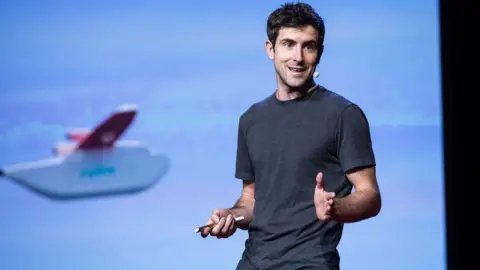US drone company eyes Tanzania for medical deliveries
 Zipline
ZiplineUS robotics company Zipline, which launched the world's first commercial drone delivery service, in Rwanda, says it is close to expanding to Tanzania.
It has been delivering emergency blood supplies within Rwanda since 2016.
Chief executive Keller Rinaudo told the TEDGlobal conference that he was in talks with Tanzania's government to open four distribution centres.
But some have suggested the real goal of the negotiations is to gain permission to begin US deliveries.
Mr Rinaudo said he hoped a deal would allow the start-up to fly a range of medical products to thousands of Tanzania's health centres.
"Having an agile supply chain for healthcare makes a big difference in improving access and empowering doctors," he said at the TED event in Arusha, Tanzania.
The UK Department for International Development promised last year to help fund Zipline's African expansion.
However, the World Bank has questioned the Silicon Valley-based company's true motivation.
"Demonstration of real commercial deals in Africa will help raise its track record for the US market," said Edward Anderson, a senior technologist at the bank in Tanzania.
He said that Zipline was "doing wonders in terms of making drones real in Africa" but questioned whether the deal - a commercial one requiring the government to pay per delivery - would go through.
"Whether the Tanzanian government will accept the terms remains to be seen," he said.
Billions of people lack adequate access to essential medical products such as blood and vaccines, and more than five million children die every year because of a lack of access to basic medical products, according to Mr Rinaudo.
The company charges between $15 and $45 (£11.60 to £34.85) per delivery, depending on product weight, urgency and distance.
"Think about what it would cost to make that journey by car, and that is about what it will cost," said Mr Rinaudo.
But he made no apology for pursuing a commercial strategy.
"One of the most important things we are trying to show is that it is possible to tackle this problem in entrepreneurial ways.
"It doesn't just have to be NGOs [non-governmental organisations] and foreign aid working on these big global issues."
If the deal goes ahead, the centres would open over the next four years, allowing blood, vaccines and other medical items to be flown to health centres.
Zipline says it is also hoping to expand its service in Rwanda to deliver further medical products.
In Rwanda, the company is serving 12 hospitals via a central distribution centre.
Doctors or medical staff requiring blood contact Zipline online or via a WhatsApp message.
Its deliveries then take an average of 20 minutes.
The company says it receives multiple orders each day.
 TED
TED"It is a magically simple experience for doctors. We send them a message saying the blood is one minute away, and they walk outside to collect it," said Mr Rinaudo.
The drones are launched from a catapult and fly below 500ft (152m) to avoid airspace used by passenger planes.
They have an operational range of 150km (93 miles).
The blood is delivered by parachute, and the drones do not land.
